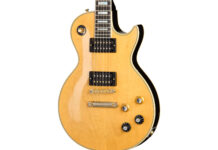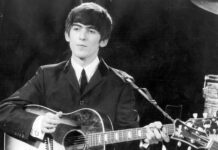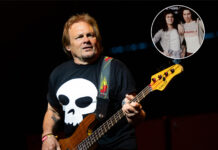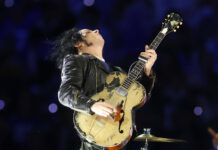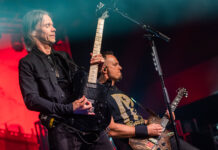
For intrepid guitarist Charlie Lim, style is ever-shifting
Charlie Lim doesn’t feel comfortable confined to one genre. The 31-year-old guitarist can play the part of sensitive singer-songwriter, blustering bluesman or slick electronic musician – often in the span of a single tune. It’s a far cry from his childhood dream of being a writer or doctor.
Born in Singapore, Lim grew up surrounded by music. As a child, he fiddled around with the family piano, took classical music lessons and even joined the school choir. So when he relocated to Melbourne, Australia at 14, he embraced a new ambition: he would become a musician. And so he ended up taking music performance in high school, even topping the state of Victoria in the subject, in 2005.
That was the time Lim also started taking the guitar seriously. Inspired by Jeff Buckley, John Mayer and Damien Rice, Lim released his debut EP, Pedestal, in 2011 while he was still in school. His follow-up record, Time/Space, arrived four years later – a long enough time for Lim to incorporate modern R&B and electronic sounds into his acoustic balladry.
And last year, Lim dropped Check-Hook, a full-length that marked yet another change for the guitarist. Peppered with synth hooks and sampled guitar parts, it swerves from introspective pop to neo-soul to UK garage, a record that’ll take you from bedroom to club and back again.
Lim tells us more about Check-Hook, his guitar heroes, and why he colour-codes his pedalboard.
Moving from Singapore to Australia at a young age, you had goals of becoming either a writer or doctor. How did music come into the picture?
It was the path of least resistance for me, because it just came very naturally. I’ve been playing music since I was a kid, and in Australia, I could actually do music as a subject in school, and I got good grades for it. One thing led to another, and I started to play music in school a lot more. I did well for music performance as a subject and managed to top the state of Victoria. I then got opportunities to play big venues and at that time, being 15 or 16, you have all these delusions of grandeur to pursue music.
Obviously, it’s not easy, as I’ve learnt many years down the line. It’s kind of the only thing that I’ve been doing. I’ve been dragged along and it feels like kind of a calling, I suppose. There have been times where I’ve contemplated quitting music, or not doing it full-time. I’ve just been blessed with opportunities to keep on doing it.
Who were some of your musical inspirations?
I started out playing the piano, and guitar [came along] was when I was 16 or 17. I was very drawn to Jeff Buckley, especially his live stuff. There’s this live double album titled Live At Sin-é, which took place at a café in New York. It just blew my mind how he was able to play with different tunings and just rearrange classic songs. It was just very entertaining.
I also liked a lot of contemporary singer-songwriters as well. Obviously, John Mayer is a big influence. He made me want to pick up the electric guitar. I just fell in love with the pursuit of finding the best tone. Damien Rice was another influence as well. He taught me that you could get by with four chords or less.
Check-Hook is a reference to a boxing technique. Does this have a personal meaning for you, and why did you chose it as your album title?
I suppose it’s a metaphor. Check-hook occurs when your opponent is charging at you and you pivot around him in order to gain control of the fight. I think it’s quite useful when you’re back against the ropes. I suppose it’s my own take on going through a particularly difficult time in my life, [where I experienced an] existential crisis. I also tried to find a different musical identity. Obviously, the sound of this album is quite different from Time/Space, and for me it was trying to take control and pivot, to see what else I could do musically.
We noticed that Check-Hook departs from the guitar-driven tunes of Time/Space. What influenced this change?
Just boredom. I knew I couldn’t do the same thing over and over again. I’m not saying that I won’t go back to the singer-songwriter thing, but I think I was bored of writing everything on guitar or piano. That being said, there’s quite a bit of guitar on the record. We tried to produce the guitar parts through recording of chords or jamming things out with friends, and from there, we’d just cut out snippets and re-sample ourselves.
That was a lot more fun to do because you’re no longer relying on muscle memory. If you’re so used to playing the same thing over and over again, you just sound like you’re practising. The well really dried up in terms of coming up with new ideas. So I think I just had to find new ways. But there’s still a lot of guitar in the tracks, whether they’re manipulated or sampled.
Pedestal has quite a bluesy approach. How did you make the leap from this to Time/Space and Check-Hook?
The first EP was very derivative of the influences I was listening to at that time. I kind of taped stuff to see if I could actually make a record at university. I did it and am proud of it. I think the sound is still quite polished. You can definitely trace a lot of the influences quite directly, and I think I hadn’t found my sound at that point in time.
With Time/Space and Check-Hook, I think there’s a stronger identity in terms of the writing and writing choices. I think the people I was playing with also influenced the way I write. Back in university, a lot of the process was band-driven as well. Moving into Time/Space and Check-Hook, it was more insular and inward-looking.
EP by Charlie Lim
What are your main guitars right now?
I have a Mayer strat, the Cypress Mica one. I also have a hot rod Tele, which Fender gave to me. I swapped out the Tele’s pickups for Florance, [whose founder] passed away recently. [Peter Florance’s] stuff was really amazing. Other than that, I have a Gibson ES-339 which I really love. My very first guitar was a Taylor 510, and it was one of the older guitars as well. I got it second-hand, or it was probably third-hand. I got it back in the 90s before Taylor had all this cool technology.
What pedals are integral to your sound?
It’s kind of remained the same over the years. I think I hit the point where I stopped buying [pedals] altogether. My very first pedal was the Keeley TS-9, or I think they modded it to sound like a vintage 808 Tube Screamer. It’s still on my ‘board. One of my favourite pedals would have to be the Keeley Proton, not sure if they make that anymore. I really like that sound.
Delay-wise, I usually [prefer something] between a slapback and a dotted-eighth kind of feel. Right now I’m using Keeley-modded Ibanez AD-9. It’s modded so you can use a switch to oscillate. So I use that for some songs.
Recently, I just got this new pedal. It’s still in a prototype stage. The guy who builds it is from Melbourne, and he passed me one. I was just blown away by it. It’s called the Unity Overdrive and his company is called UME. I think they’ll probably hit the market soon but it sounds amazing. It’s a drive pedal, but it’s also one of those very good boost pedals that you can really milk the signal out of. The drive on it is not a TS-heavy sound and it’s not as gnarly as the Timmy.
What aspect of your guitar rig would surprise people?
How colour-coded everything is. I have a smaller tone board that’s just black and yellow, and if one colour isn’t right, I freak out. I have another board that looks like Skittles.
Grab a copy of Check-Hook at charlielim.net.
The post For intrepid guitarist Charlie Lim, style is ever-shifting appeared first on Guitar.com | All Things Guitar.
Source: www.guitar-bass.net

